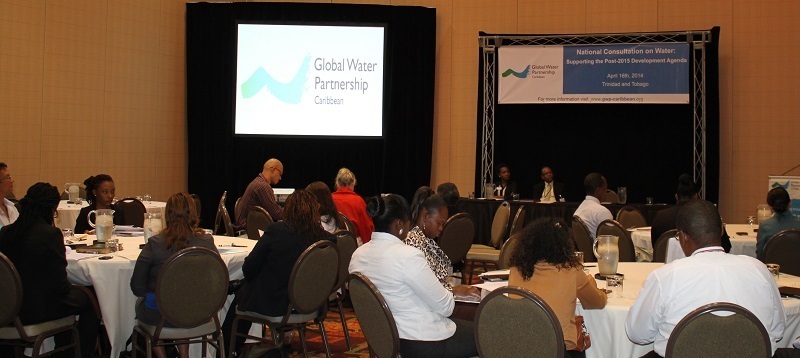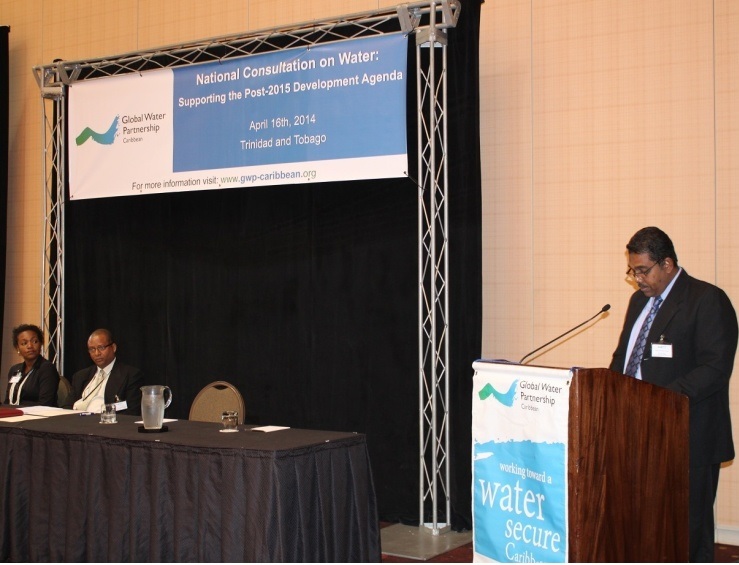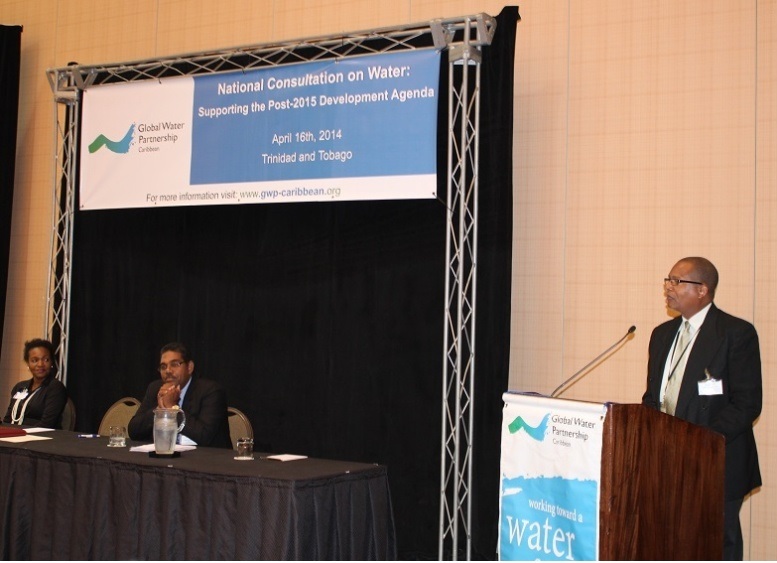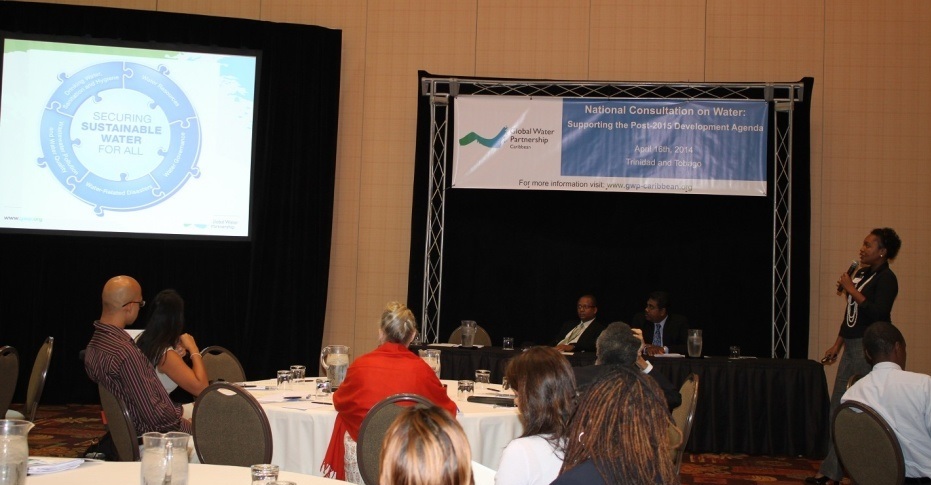
A cross-section of stakeholders at the National Consultation in Trinidad and Tobago to support a Global Goal for Water.
Of the 26 countries selected for the global initiative, Trinidad and Tobago was the only Caribbean territory. The National Consultation was therefore crucial in ensuring that stakeholder inputs received from Trinidad and Tobago will influence the larger global policy dialogue and will help to ensure that the Caribbean has input into the Post-2015 Development Agenda.
The UN Conference on Sustainable Development in Rio de Janeiro, in June 2012 (Rio+20) triggered a broad consultative exercise both within and external to the UN, to consider the Post-2015 Development Framework. In 2013, the Global Water Partnership (GWP) and the United Nations Development Programme (UNDP) was a part of this activity, as it led a global consultation process by hosting national dialogues on Water in twenty-two (22) selected countries as a follow-up to the UN Survey on Water Resources Management which was carried out in 2011. The national consultations were carried out to get country level feedback from the 22 countries on their water priorities, to help shape the UN Post-2015 Sustainable Development Agenda.
Antigua and Barbuda had been selected as the focus country from the Caribbean region for these dialogues. As the Caribbean arm of the GWP, the Global Water Partnership-Caribbean (GWP-C) contributed to the global exercise, by working together with its partner, the Antigua Public Utilities Authority (APUA) to host a one-day Consultation in April 2013 under the theme “Water in the Post-2015 Development Agenda” to get stakeholders’ input at the country level.
The National Stakeholder Consultation held on April 16th, 2014 in Trinidad, formed part of the second phase of this global exercise to discuss the proposals for a Water Goal in the Post-2015 Development Agenda, together with specific targets and indicators for such a goal to help meet sustainable development priorities from a national perspective.
For the National Consultation, GWP-C was able to bring together a wide cross- section of stakeholders {over forty (40)} from more than thirty (30) organisations. Stakeholders present at the Consultation included representatives from:
- Water and environment sectors/related sectors
- Government ministries such as planning, finance, food and agriculture, energy, industry, health and others
- Local representatives from UN agencies
- Universities and educational institutions
- Non-governmental organisations (NGOs)
- Journalists/Media

Mr. Wayne Joseph, Regional Coordinator of the Global Water Partnership-Caribbean (GWP-C) is seen here delivering welcome remarks at the National Consultation hosted by the GWP-C.

Mr. Peter Mitchell, Acting Assistant Director of the Soci-Economic Policy and Planning Division of the Ministry of Planning and Sustainable Development of Trinidad and Tobago is seen giving the feature address at the event.
Preceding the start of the Consultation was a short opening ceremony which featured welcome remarks from Mr. Wayne Joseph, Regional Coordinator of the GWP-C. In his remarks to the over forty (40) stakeholders gathered at the event, Mr. Joseph provided participants will a comprehensive overview of the purpose of the Consultation and GWP-C’s work and role in supporting the global process. Moreover, he informed participants of how significant their inputs at the national level would be in supporting a Global Goal for Water.
Also delivering remarks at the opening of the National Consultation was Mr. Peter Mitchell, Acting Assistant Director of the Soci-Economic Policy and Planning Division of the Ministry of Planning and Sustainable Development of Trinidad and Tobago. Mr. Mitchell’s remarks were valuable and timely as he provided insight into the Ministry’s involvement at the national level in supporting the Post-2015 Development Agenda. He explained that the Ministry was also involved in similar UN processes in attaining feedback from stakeholders on various thematic areas such as: poverty reduction and gender equality, food security, climate change adaptation, among other areas. He also expressed how essential the National Consultation on Water hosted by the GWP-C would be in contributing to the Post-2015 Development Agenda.

Mrs. Frances Hanson-Lewis, Facilitator of the National Consultation is seen here providing stakeholders with an overview of the proposed case for a Global Goal for Water.
Following the short opening ceremony, stakeholders received clear guidelines on the purpose, objectives and format of the Consultation from Mrs. Frances Hanson-Lewis, the Consultant who facilitated the Meeting.
Five (5) key targets for the proposed Water Goal in the Post-2015 Development Agenda were developed for stakeholders to provide in-depth feedback and indicators from a national perspective.
These five (5) targets were:
- Achieve universal access to safe drinking water, sanitation and hygiene.
- Improve by an agreed percentage, the sustainable use and development of water resources in countries.
- All countries strengthen equitable, participatory and accountable water governance.
- Reduce untreated wastewater, nutrient pollution and increase wastewater reuse by set percentages.
- Reduce mortality and economic loss from natural and human induced water-related disasters by set percentages.
The format of the Consultation was designed to be very interactive as stakeholders were broken-up into five (5) working groups with each group assigned one of the above five (5) targets. Each group was required to form realistic targets and measurable indicators for the Post-2015 Development Agenda. Groups were asked to list actions in order to achieve their target statements, identify and measure indicators and determine the limitations and threats to Trinidad and Tobago’s capacity to report, monitor and fund actions.
The methodology implemented led to very fruitful discussions and outputs amongst all groups. A Country Report for Trinidad and Tobago has been produced capturing the stakeholder inputs on the key targets for a Global Goal for Water. The Report will be taken forward to help shape the Post-2015 Development Agenda.
GWP-C will circulate the Country Report to all participants at the National Consultation, its Partners, relevant government officials, among other stakeholders. The Report will also be available on the GWP-C website in the coming weeks.